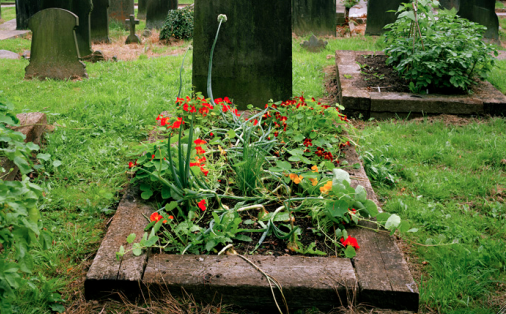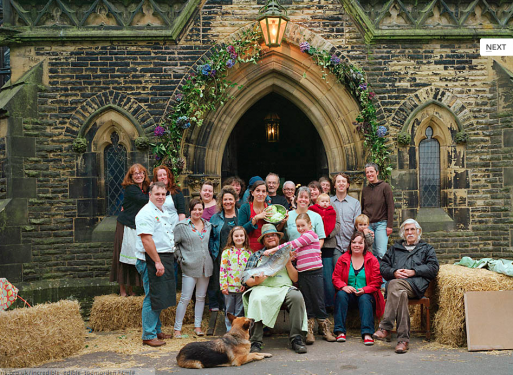To many of us, cultivating the land where we’ve buried a loved one is no strange practice. Every Easter after church (the one day a year we did go to church), my family and I would drive to my father’s parents and, still wearing his Sunday best, my father would tend to their graves, plant new lilies, trim the rosebush, sweep the dirt off their names. What things my father must have felt—longing? peace?—while digging his hands into the soil that concealed if not became the grandparents already gone by the time I was born. Most of these plants, though, are ornamental. Flowers, vines, all bright colors and soft petals, fulfilled little other purpose than to lend the end of life their transient beauty.
They strive to make us think about our relationship to the earth through growing food in every nook and cranny of our daily urban landscape. So why should graves go untouched?
But what if the plants were vegetables? What if we turned the soil of our loved ones into food? No doubt such an idea may ward off many a grave-tending gardener, but Incredible Edible, a group of progressive agriculturists in the UK, are rethinking the way we perceive and maintain every part of our land—including our graveyards. “It’s a funny thing to come to a graveyard and come away with a pink cauliflower,” says a journalist who did a short documentary on these enthusiastic public gardeners. They strive to make us think about our relationship to the earth through growing food in every nook and cranny of our daily urban landscape. So why should graves go untouched?
Can’t such an explicit process of turning death into life reaffirm the positive change from one form of life to another?
To some people, turning a grave into something practical, something edible, may disregard the sacredness of a monument. But can’t it be seen another way? Can’t such an explicit process of turning death into life reaffirm the positive change from one form of life to another? (Then again, would I want to eat kale grown from my grandfather? Hmm.)
What are your thoughts on graveyard gardening? We look forward to your comments below.
More from “Something Special”:
- Kicking The Bucket: A Festival of Living and Dying
- Diamonds are Forever
- Seriously? The Dawn of the “Funeral Selfie”

 Would You Grow Vegetables in a Graveyard?
Would You Grow Vegetables in a Graveyard?





 The Spiritual Symbolism of Cardinals
The Spiritual Symbolism of Cardinals
 Meaning-Focused Grief Therapy: Imaginal Dialogues with the Deceased
Meaning-Focused Grief Therapy: Imaginal Dialogues with the Deceased















What it the disease could be passed on through veg and fruit from the deseased?
Surely this is not healthy
Report this comment